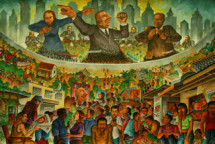Reserves for emancipatory politics in post-war northern Sri Lanka
Topics
Regions
Situating questions about neoliberalism, nationalism and populism in Sri Lanka helps to broaden understanding of historical and political developments. Do neoliberal policies emerge in the West and then spread to the Global South, or do neoliberal policies evolve in confrontations with nationalist, populist and other political projects and go through considerable innovation in the Global South?

Authors
What can we learn about the relationship of neoliberalism to authoritarian populism, when we look at a place like northern Sri Lanka, where neoliberal policies were only implemented after tremendous nationalist mobilisations? Would the collapse of militant nationalist forces – and for that matter authoritarian populist regimes – necessarily lead to new forms of emancipatory politics or strengthen neoliberalism?
In Sri Lanka, ravaged by ethnic conflict and a civil war, nationalism for decades was at the centre of political debates. In fact, political economic questions, including about neoliberalism – though Sri Lanka was the first country in South Asia to liberalise its economy in 1977 – were side-lined by even leftist intellectuals due to the urgency of addressing the civil war.
This intellectual anomaly of contemporary analysis of nationalism preceding critiques of neoliberalism provides an interesting vantage point to engage the recent international scholarly interest on authoritarian populism. Even as critiques of neoliberalism gained mainstream importance after the global economic crisis of 2008, contemporary forms of nationalism and populism, and in so me intellectual debates the constitution of authoritarian populism, have emerged as a central question.
These concerns have gained further attention with the election of Trump in the US and Brexit in Europe; however, the resurgence of nationalism in the West has a longer trajectory with rising anti-immigrant politics over the last few decades. Interestingly, the common narrative of the emergence of neoliberalism also begins with changes in the US and UK, with the rise of Reagan and Thatcher respectively.
This discussion of neoliberalism, nationalism and authoritarian populism that privilege developments in the West and particularly, the US and UK, are subject to debate. We engage questions about neoliberalism, nationalism and populism and their relationship to authoritarian power from the periphery; the war-devastated rural districts in northern Sri Lanka. The location of a rural war-torn region provides for analysis of the deeper reach of neoliberalism, nationalist politics and populist measures, as they have to percolate through disrupted economic and political structures after decades of devastation.
The resistance in turn to neoliberal policies, nationalist mobilisations and populist measures, by rural struggles and movements suggest possibilities for the emergence of new forms of progressive rural politics. The character of such rural struggles and the structure of the rural movements, their relationship to caste contradictions and women’s everyday politics, as well as their engagement with the state provide insights about the constraints and potential for emancipatory rural politics.
This paper was presented at the Emancipatory Rural Politics Initiative (ERPI) 2018 Conference: "Authoritarian Populism and the Rural World"